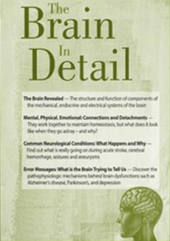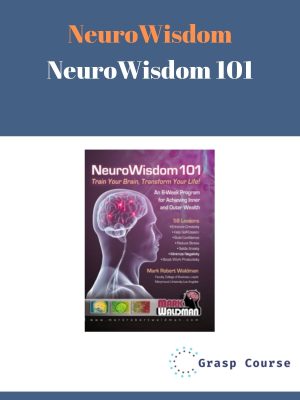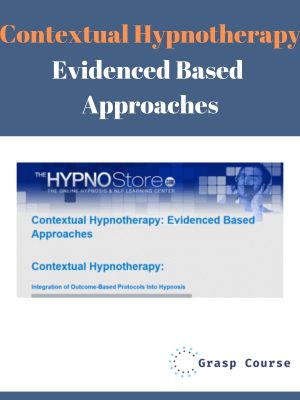Sean G. Smith – The Brain in Detail
$219.00 Original price was: $219.00.$62.00Current price is: $62.00.
Available for Pre-Order. This product will be available within a few days.
Sean G. Smith – The Brain in Detail
Description:
- The Brain Revealed — The structure and function of components of the mechanical, endocrine and electrical systems of the brain
- Mental, Physical, Emotional: Connections and Detachments — They work together to maintain homeostasis, but what does it look like when they go astray – and why?
- Common Neurological Conditions: What Happens and Why — Find out what is really going on during acute stroke, cerebral hemorrhage, seizures and aneurysms
- Error Messages: What is the Brain Trying to Tell Us — Discover the pathophysiologic mechanisms behind brain dysfunctions such as Alzheimer’s disease, Parkinson’s, and depression
Did you know that there may be permanent damage to the brain during TIA?
Or, wonder what exactly your neuro checks assess?
Or, become intimidated by caring for patients with neurological problems?
If you have a hard time explaining to your patients about why their heart disease is a risk factor for stroke, or how shrugging their shoulders and sticking out their tongues assesses their brain function, or what to watch for as signs of adverse effects of medications, then you need to go back to the basics with the help of a program that can make the information easy and understandable.
Most of us learned our anatomy, physiology, and pathophysiology in school, where we were focused primarily on passing the class. We memorized, we studied, but we quickly forgot.
You learn differently now. With years of experience, your brain has learned to classify your professional information into “file folders” based on your clinical experiences. Now, when you go back to learn these concepts, your brain will put the information into the correct “folder” to use the next time you encounter a patient with that problem. In other words, you will retain the information now that you have a way to organize it.
Attend this program and gain the essential concepts of neurological anatomy, physiology, and pathophysiology that will help you find patient complications faster and respond to them more appropriately. In addition:
- You will communicate more effectively with physicians and your peers
- You will feel more confident
- You will provide safer and more effective care
You don’t want to miss this exciting and applicable program to help improve outcomes and take your healthcare practice to the next level!
OUTLINE
The Brain Revealed — The structure and function of components of the mechanical, endocrine and electrical systems of the brain
Anatomy
- Life of a neuron
- Brain structure
- Spinal cord
- Peripheral Nervous System
- Autonomic Nervous System
- Aging and the Nervous System
Assessment
- Cranial Nerves
- Motor Function
- DTRs
- Levels of Consciousness
- Intracranial Pressure
Diagnostic Tests
- Lumbar Puncture
- CAT/MRI
- Angiogram
- EEG
Mental, Physical, Emotional: Connections and Detachments — They work together to maintain homeostasis; but what does it look like when they go astray – and why?
Spinal Disorders
- Herniated Disc
- Spinal Stenosis
- Spinal Cord Injury
- Degenerative Neuromuscular Disorders
- Huntington’s Chorea
- Multiple Sclerosis
- Myasthenia Gravis
- Amytropic Lateral Sclerosis
- Guillain-Barré Syndrome
Cranial Nerve Disorders
- Trigeminal Neuralgia
- Bell’s Palsy
- Ménière’s Disease
Common Neurological Conditions: What Happens and Why
Central Nervous System Disorders
- Headaches
- Cerebral Vascular Disorders: TIA and Stroke Aneurysms
- Seizure Disorders
- Traumatic Brain Injuries
- Brain Tumors
- Effects of Alcohol and Alcoholism on the Brain
Error Messages: What is the Brain Trying to Tell Us?
- Dementias
- Parkinson’s Disease
- Depression
OBJECTIVES
- Define the anatomy and physiology of the neurological system and how this manifests in physical symptoms.
- Identify neurologic assessment modalities and the connection between how the brain works and the visual assessment.
- Categorize interventions and strategies for patients with traumatic brain injury based on the pathophysiological process and the long-term effects from these injuries.
- Describe how chemical imbalances and impulses create disorders such as dementias and Parkinson’s disease.
- Describe the best method for patient education based upon the knowledge of the pathophysiology of the most common neurological conditions.
Would you like to receive Sean G. Smith – The Brain in Detail ?
ABOUT THE SPEAKER
SEAN G. SMITH, RN, BSN, NREMT-P, C-NPT, CCRN, CMC, CEN, CFRN, FP-C, CPEN, has experience writing neo-natal/pediatric pharmacology CE exams for the American Association of Critical Care Nurses, as well as writing for Mosby clinical updates. He has also practiced and taught Critical/Emergency Care and Prehospital Emergency Medical Services for over 12 years. Career highlights include research in molecular endocrinology, serving in the US Navy, a wide variety of ICUs, flight nursing, and medical missions (Dominican Republic, Honduras, Morocco, Haiti, and Nepal), as well as medical support to NASA. Sean lectures at the national level and has extensive text review/exam writing/contributing author credits. He holds multiple advanced specialty certifications in Critical Care and Emergency, and Flight nursing, as well as Cardiac Medicine and Neonatal/Pediatric Critical Care Transport.
Sean is leading a nonprofit organization to promote both Critical-Care and Emergency Clinical Education, as well as exploring screening and referring newborns for metabolic disorders and congenital heart defects in medically underserved areas and underdeveloped countries. He is also an official instructor for the Neonatal Resuscitation Program (NRP), Basic Life Support (BLS), Pediatric Advanced Life Support (PALS), Advanced Cardiac Life Support (ACLS), Tactical Combat Casualty Course (TCCC), Geriatric Education for Emergency Medical Services (GEMS), Advanced Assessment and Treatment of Trauma (ATT), Fundamentals of Critical Care Support (FCCS), and Pediatric Fundamentals of Critical Care Support (PFCCS-IC).
Disclosures:
Financial: Sean G. Smith is receiving a fee for speaking at this educational activity.
Nonfinancial: Sean G. Smith has no relevant nonfinancial relationships to disclose.
Be the first to review “Sean G. Smith – The Brain in Detail” Cancel reply
Related products
NLP - Self-help - Dating
NLP - Self-help - Dating
Richard Bandler – 30 Courses Collection | Happy Life, Neuro Hypnotic, Persuasion, …
NLP - Self-help - Dating
NLP - Self-help - Dating
NLP - Self-help - Dating
NLP - Self-help - Dating
NLP - Self-help - Dating
NLP - Self-help - Dating












Reviews
There are no reviews yet.